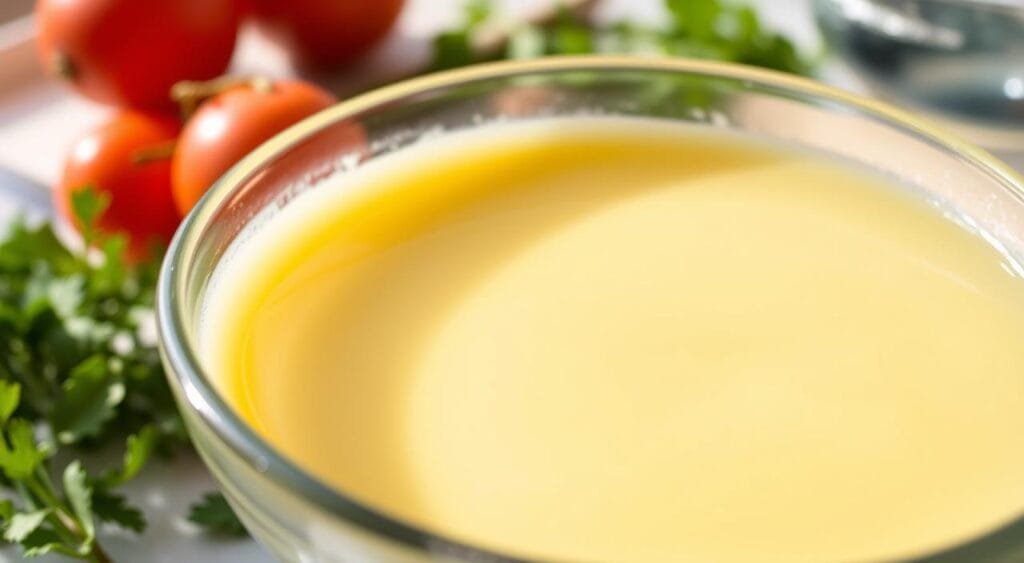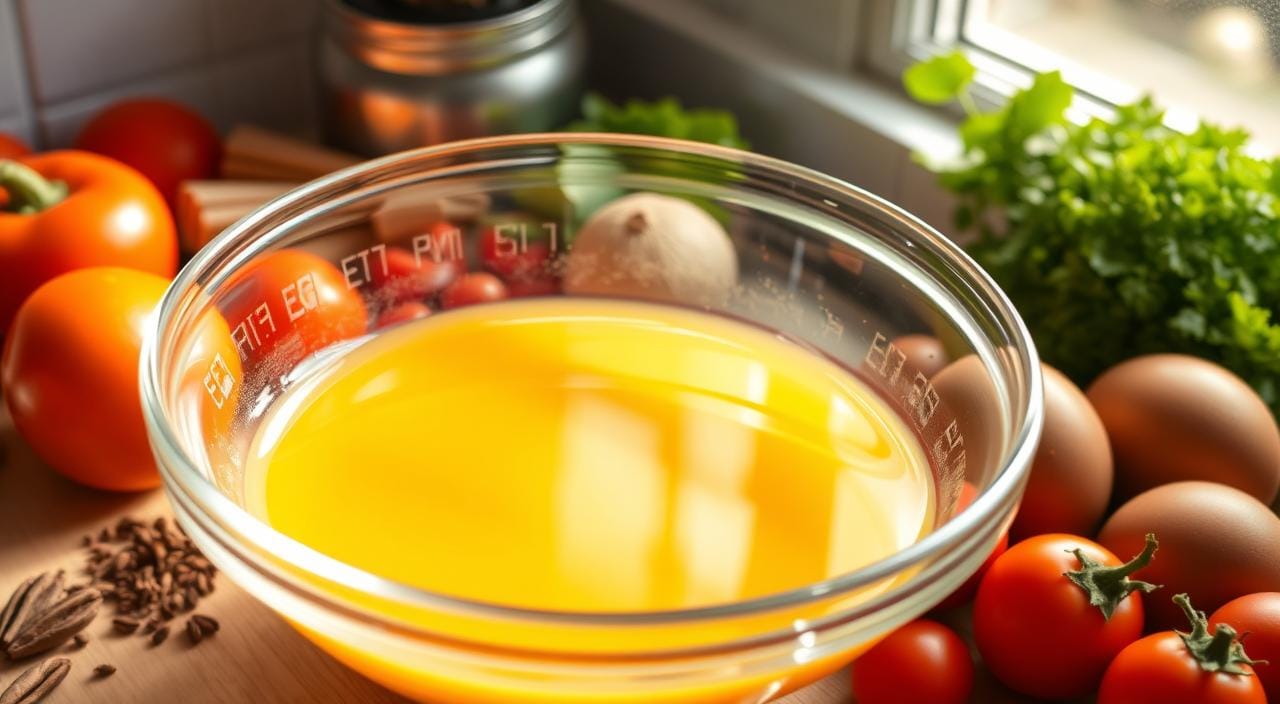As a home cook, I’ve always been fascinated by eggs. They’re the base for many dishes, from fluffy omelets to rich custards. Recently, I’ve seen more people using liquid eggs, a convenient alternative. But are they a good choice, or should I stick with traditional eggs?
Liquid eggs are marketed as “egg substitutes” or “egg alternatives.” They’re a hassle-free way to add eggs to your recipes. You can find them in different forms, like whole eggs, egg whites, and even organic options. A 16-ounce pint of liquid eggs is about the same as 10 shell eggs, making them very convenient.
Liquid eggs also have a longer shelf life and are safer to use. They have the same nutritional value as regular eggs. You can easily replace 1 whole egg with 3 tablespoons of liquid eggs in your recipes. This makes them perfect for making fluffy quiches or baking cakes.
Understanding What Liquid Eggs Really Are
Liquid eggs, also known as egg products, come from real eggs. They are cracked, deshelled, and processed for ease. These ingredients can be whole eggs or just egg whites. Some also have natural citric acid to keep them fresh longer.
Composition and Processing Methods
Liquid eggs are made with care to keep them safe and nutritious. First, eggs are split into yolks and whites. Then, they are pasteurized to kill harmful bacteria like Salmonella.
This pasteurization heats the eggs to a certain temperature. It kills off bad bacteria but keeps the good stuff in.
Different Types of Liquid Egg Products
There are many types of liquid eggs available. You can find pasteurized eggs, egg products, and even egg beaters. Egg beaters are made from 100% egg whites. These options make cooking easier and more flexible.
Pasteurization Process Explained
Pasteurization is key in making liquid eggs safe. It heats the eggs to a certain temperature for a while. This kills off bad bacteria but keeps the good stuff in.
The result is a safe, shelf-stable liquid egg product. It’s great for many recipes and uses.

Nutritional Value Comparison with Shell Eggs
Liquid eggs have similar nutritional benefits to shell eggs. They offer high-quality protein, essential vitamins, and important minerals. The egg whites in both forms are almost identical. They are also cholesterol-free and low-fat, making them a healthier option.
Some liquid egg products, like Just Egg, are plant-based. They mimic chicken eggs in protein content. Even though they lack some nutrients found in traditional eggs, they are still a good choice for those looking for cholesterol-free and low-fat protein.
“Liquid eggs provide the same essential nutrients as shell eggs, making them a convenient and versatile choice for your meals.”
The nutritional value of liquid eggs and shell eggs is very close. Both are nutrient-dense and offer high-quality protein and other essential nutrients. Your choice between them depends on personal preference, dietary needs, and how you plan to use them in cooking or baking.

Benefits of Choosing Liquid Eggs
Liquid eggs are a great choice for both home cooks and commercial kitchens. They save time because you don’t have to crack, separate, or measure eggs. Just pour what you need and you’re good to go.
Extended Shelf Life
Liquid eggs last longer than shell eggs. Pasteurized liquid eggs can stay in the fridge for up to 10 days. Shell eggs, on the other hand, only last 3-5 weeks. This longer shelf life means less waste and always having eggs on hand.
Food Safety Advantages
Liquid eggs, especially pasteurized eggs, are safer. The pasteurization process kills Salmonella and other harmful bacteria. This makes them a safer choice for those worried about raw or undercooked eggs.
“Liquid eggs are a game-changer for busy home cooks and commercial kitchens. They save time, reduce waste, and provide the peace of mind that comes with a safer, pasteurized product.”
Whether you’re making breakfast, baking, or cooking for a big group, liquid eggs are a reliable choice. They make food prep easier and ensure your dishes are safe and of high quality.
Common Uses and Applications
Liquid eggs are now used in many ways, both at home and in food production. They’re great for making scrambled eggs, omelets, and even baked goods. They’re also perfect for recipes that need beaten eggs.
People who watch their health like liquid egg whites. They’re low in fat and cholesterol, perfect for recipes needing egg whites. Some brands even offer plant-based egg substitutes for vegans and vegetarians.
Liquid egg products save time and last longer than regular eggs. This is great for big kitchens and food places. They’re perfect for making pancakes or a rich quiche, making them a reliable choice in cooking.
Cost Analysis: Liquid Eggs vs Regular Eggs
Choosing between liquid eggs and regular eggs involves looking at cost. Liquid eggs might seem pricier at first, but they can be a better deal in some cases.
Price Comparison Per Serving
Liquid eggs cost more than regular eggs. But, they offer convenience and less waste. This makes them a good choice, especially if you often throw away eggs before using them all.
Their longer shelf life means you’ll use up more eggs. This can balance out the higher cost per serving.
Value for Commercial Kitchens
In commercial kitchens, liquid eggs are a smart choice. They let you use just the right amount without waste. This saves money and time.
They also save on labor. No need to crack and separate eggs anymore. This is a big plus in busy kitchens.
Consumer Budget Considerations
Think about how many eggs you use at home. If you often have eggs left over, liquid eggs might save you money. But, if you always use up all the eggs, regular eggs might be cheaper.
It’s all about your needs and how you use eggs. Consider convenience, waste, and time saved. This will help you choose the best option for your kitchen and wallet.
Health and Safety Considerations
Health and safety are key when it comes to liquid eggs. Luckily, pasteurized eggs are a safe choice compared to regular eggs. The pasteurization process kills harmful bacteria like Salmonella. This makes pasteurized liquid eggs safe to eat raw, lowering the risk of getting sick from food.
If you’re looking for something without cholesterol, cholesterol-free eggs are a great pick. Studies have shown that eggs don’t raise blood cholesterol levels as much as thought. This makes them a good choice for those watching their health.
“Liquid eggs provide a safe alternative for recipes calling for raw eggs, such as homemade mayonnaise or Caesar dressing.”
Using liquid eggs also means less chance of contamination during cooking. They are made and packaged in a clean, controlled space. This is especially good for big kitchens, where keeping food clean is very important to avoid spreading sickness.
By picking pasteurized liquid eggs and cholesterol-free eggs, you can enjoy their benefits without worrying about your health. Whether you cook at home or work in a kitchen, these options are safe and reliable for your recipes.
Environmental Impact and Storage Requirements
Choosing liquid eggs is better for the environment than traditional shell eggs. Liquid egg products come in recyclable cartons. This reduces waste and helps keep food fresh longer.
Packaging Sustainability
Recyclable cartons for liquid eggs are better than disposable egg shells. They help cut down on landfill waste. Plus, liquid eggs often have a lower carbon footprint during transport.
Proper Storage Guidelines
Keeping liquid egg products fresh and safe is key. Unopened cartons can stay in the fridge for weeks, until the expiration date. After opening, use them within a few days. Always check the expiration date and follow the manufacturer’s storage tips.
Opting for liquid eggs supports a greener food system. With the right storage, they’re a handy and eco-friendly choice for cooking and baking.
Best Brands and Options Available
Choosing the best liquid egg options means looking at top brands. Egg Beaters is known for its egg substitute, made from real eggs but without cholesterol and fat. Just Egg, on the other hand, is a plant-based alternative made from mung beans, perfect for vegans.
Chino Valley Ranchers offers pasture-raised liquid whole eggs and organic liquid egg whites. These eggs have a better nutritional profile because hens have lots of space to roam. Eggland’s Best Eggs are also popular for their extra vitamins and minerals, like vitamins A, B12, D, and E, and Omega-3s.
Organic Valley and Farmer’s Hen House provide a variety of egg products, from whole eggs to egg bites and whites. Quail eggs from Manchester Farms are also great, offering more iron and potassium than regular eggs.
“Liquid eggs are a game-changer for commercial kitchens, offering consistent quality, simplified processing, and enhanced product performance.”
Looking for a healthier egg substitute, pasture-raised whole eggs, or a convenient liquid egg option? The market has many high-quality choices to meet your needs.
Conclusion
Liquid eggs are a great choice for those looking for a convenient egg option. They have the same nutrients as regular eggs but last longer. They also make food safer to eat.
Even though they cost a bit more, the benefits of using liquid eggs are worth it. They save time and are easy to use. This makes them a good choice for anyone looking for a reliable egg substitute.
Whether you choose to use liquid eggs or regular eggs, it’s important to pick high-quality ones. This ensures you get the nutrients you need. By making smart choices, you can enjoy the benefits of liquid eggs in your cooking.
FAQ
What are liquid eggs and how are they different from regular shell eggs?
Liquid eggs are made from real eggs that have been cracked and processed. They can be whole eggs or just egg whites. Some may have citric acid to keep them fresh. They are as nutritious as shell eggs but last longer and are safer to eat.
What are the different types of liquid egg products available?
You can find liquid eggs in whole, egg white, and pasteurized forms. Pasteurization heats the eggs to kill bacteria while keeping nutrients.
Do liquid eggs have the same nutritional value as regular shell eggs?
Yes, liquid eggs have the same nutrients as shell eggs. They are high in protein and vitamins. Whole liquid eggs are as nutritious as regular eggs. Egg whites are fat-free and low in cholesterol.
What are the main benefits of choosing liquid eggs over regular shell eggs?
They are easy to use and last longer than shell eggs. They are safer to eat because they don’t have the risk of raw egg illnesses.
How can liquid eggs be used in cooking and baking?
You can use theme in many recipes like scrambled eggs and baked goods. They are great for home cooking and big food productions.
Are liquid eggs more expensive than regular shell eggs?
Liquid eggs might cost more per serving than regular eggs. But they save time and reduce waste. For big kitchens, they can save money by being easier to measure and prepare.
Are liquid eggs safe to consume raw?
Yes, pasteurized liquid eggs are safe to eat raw. They lower the risk of Salmonella. Egg whites are also a low-fat, cholesterol-free choice.
How should liquid eggs be stored and what is their shelf life?
Store theme in the fridge in their cartons. Unopened cartons last weeks. Once opened, use them within days.
What are some popular brands of liquid eggs and what makes them unique?
Brands like Egg Beaters, Just Egg, and Chino Valley Ranchers are popular. Chino Valley Ranchers has pasture-raised and organic options. Just Egg is a plant-based choice made from mung beans.
